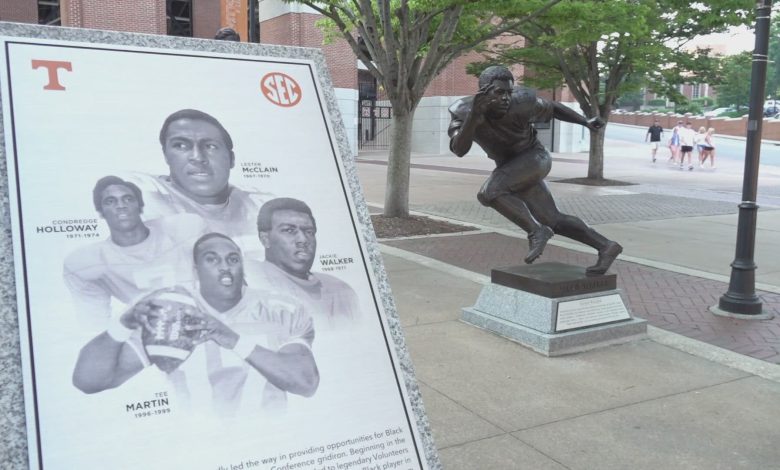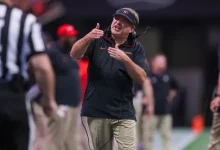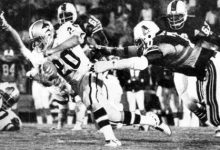Jackie Walker Linebacker (1969-71) refined the role of linebacker at Tennessee, already hard-hitting, but also brought speed and agility to the position.

When discussing the legacy of Tennessee football, names like Reggie White and Peyton Manning often headline the conversation. But deep within the proud history of the Volunteers is a figure whose impact was both groundbreaking and ahead of his time: Jackie Walker, the standout linebacker from 1969 to 1971 who not only excelled on the field, but revolutionized how the linebacker position was played.
Walker wasn’t just a star. He was a pioneer—both athletically and socially—and his legacy remains one of the most significant in Tennessee football history.
Playing in an era where linebackers were mostly known for brute strength and interior run-stopping, Jackie Walker brought something new to the table: speed, fluidity, and sideline-to-sideline agility.
At 6’0″, 210 pounds, Walker had the frame of a traditional linebacker, but his athleticism allowed him to do what few at the position could: drop into coverage like a safety, shadow receivers across the field, and make game-changing plays in space. His instincts were elite, and his football IQ unmatched.
In 1970, Walker etched his name into the Tennessee record books—and national history—by recording five interceptions, two of which he returned for touchdowns. His ability to read quarterbacks and cover ground made him a menace in passing situations, a trait that would later become the standard for modern linebackers but was nearly unheard of at the time.
“Jackie was doing in 1970 what NFL outside linebackers didn’t start doing until the 1990s,” said longtime Vols historian Tom Mattingly. “He was simply ahead of his time.”
In addition to his on-field greatness, Walker also holds a historic place in SEC and Tennessee history. In 1969, he became one of the first Black players to start for the Tennessee Volunteers, following in the footsteps of Lester McClain, the university’s first Black varsity football player.
Walker’s presence was a powerful symbol during a time of racial tension and transformation in the South. Not only did he start, but he starred—earning All-SEC honors twice and becoming a consensus All-American in 1971, the first Black player at Tennessee to earn such recognition.
“It wasn’t just that he played,” said former teammate Conrad Graham. “It’s that he dominated. Jackie made it clear—he belonged at the very top.”
His success challenged outdated stereotypes and opened the door for future generations of Black athletes in the SEC.
Over his three seasons (freshmen couldn’t play varsity at the time), Walker helped lead Tennessee to a 30–5 record, including:
- An SEC Championship in 1969
- A Sugar Bowl win over Air Force in 1970
- Multiple top-10 finishes in national polls
He finished his career with 11 interceptions, a remarkable number for a linebacker, and remains one of the few players in NCAA history to return two interceptions for touchdowns in a single season.
In 1971, he was again the heart of a dominant Tennessee defense, finishing his senior year with 89 tackles, 3 sacks, and numerous pass breakups.
Walker was drafted in the 6th round of the 1972 NFL Draft by the San Francisco 49ers, but his professional career never fully materialized. He played briefly in the World Football League but struggled to find a consistent role in the NFL.
Behind the scenes, Walker battled deeply personal challenges. In later years, it was revealed that Walker was quietly living as a gay man during his playing career—a fact he kept hidden in an era of intense stigma and limited acceptance.
His bravery, though largely unrecognized at the time, now places him at the intersection of both racial and LGBTQ+ sports history—a pioneer in more ways than one.
“Jackie lived with a burden most of us never understood,” a former teammate said. “But he carried it with grace—and never let it stop him from greatness.”
For decades, Walker’s story remained largely forgotten outside of Tennessee circles. But in recent years, there’s been a resurgence of appreciation for what he achieved and what he symbolized.
In 2021, the university celebrated the 50th anniversary of his All-American season with a video tribute during a home game at Neyland Stadium. Former teammates, family members, and fans gathered to honor a player whose legacy had finally come full circle.
The UT Athletics Department has also begun efforts to better recognize Walker’s place in program history, exploring permanent displays in the locker room and an annual award in his name to honor “leadership, courage, and excellence in adversity.”
In a football era where hybrid linebackers like Micah Parsons, Roquan Smith, and Fred Warner are redefining the position with speed and coverage ability, Jackie Walker’s style of play suddenly feels familiar—yet decades ahead of its time.
He wasn’t just a linebacker. He was a prototype, one that came years too soon for the NFL to fully appreciate. At Tennessee, however, his name is now spoken with reverence not just for his skill, but for what he represented:
- A game-changing athlete
- A barrier-breaking leader
- A quiet, courageous trailblazer
“Jackie Walker should be a household name,” said ESPN’s Ryan McGee. “What he did in the SEC—in that era, with those expectations—is one of the most under-told stories in college football history.”
Jackie Walker’s time in Knoxville may have lasted just three seasons, but his legacy spans generations. He helped change how linebackers play, helped break racial barriers in the South, and lived a life of dignity in the face of silent battles.
In many ways, Walker embodied what it means to be a Tennessee Volunteer—a leader, a fighter, and a symbol of progress.
Today, as the game continues to evolve and as college football honors its pioneers, Jackie Walker’s name deserves to be lifted not just into Tennessee’s Ring of Honor—but into the broader conversation of American sports icons.
He didn’t just play linebacker.
He redefined it.
And in doing so, he helped redefine what was possible.








